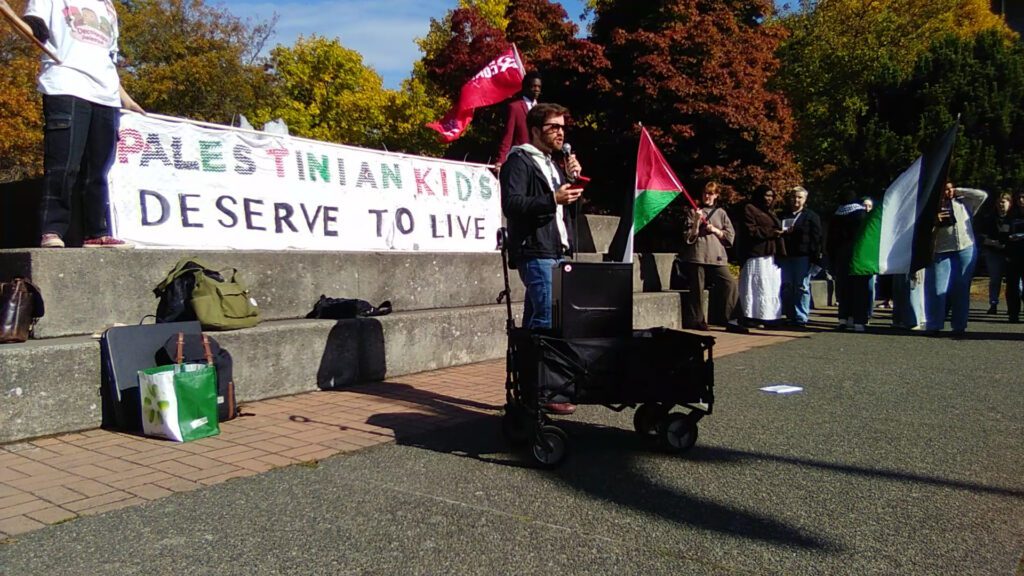While the encampment has been defeated, UVic students are still fighting their institution until it divests from the genocide in Gaza. But can they muster the numbers for a student strike?

One hundred students urged their peers to walk out of class ahead of a vote at the University of Victoria Students’ Society (UVSS) general assembly next week for a student strike aimed at pressuring the university foundation into divesting from corporations complicit in Israel’s genocide in Gaza and beyond.
This protest was only the latest in a long campaign by students duelling with University of Victoria president Kevin Hall over continued investments in weapon manufacturers and others enablers of the Zionist regime, such as ThyssenKrupp, which provides the Israeli navy with warships for its naval blockade of Gaza, and tech giants such as Google and Amazon which partner with Israel’s government in mass surveillance of Palestinians.
The university has responded to the allegations in a tone deaf manner, dodging the accusations by pointing out the holdings in question are largely indirect, such as through mutual funds such as one managed by investment firm BlackRock. It also invokes the BC Human Rights Code in its defence, an allegation I call spurious being a legal advocate specialising in human rights law; if nothing else, corporate investments aren’t a service commonly available to the public, while the divestment demands do not revolve on protected characteristics under the Code.
In the past several weeks, a committee of students undertook to escalate the resistance following the crushing failure of the encampment, by joining a national university student strike movement. This walkout was held in collaboration with the local chapter of the Revolutionary Communist Party, which I do not endorse but have to concede its message today: capitalism fuels this crisis, and divestment is the only realistic strategy to shut the war machine down.
Convincing students to mobilise in sufficient numbers, however, is proving difficult. While respectable, today’s turnout is a small fraction of those I recorded in previous walkouts such as the one in January, and a far cry from the numbers required to secure a student strike. When we marched around the campus, exhorting students to join us, the reaction from bystanders was indifference. It could be that they feared expressing their support or opposition openly, or could signal fatigue from a crowd that has done much yet obtained little in the past year. How this may reflect on the upcoming vote is unclear.
I have noticed that while this campaign coordinates with the organisers of the weekend Palestine rallies, it proceeds without the backing of organisations outside of socialist circles, like Independent Jewish Voices Canada and the Tzedek Collective, which have proven instrumental in keeping students engaged in the past. This may largely explain the disappointing turnout in spite of the outstanding level of organisation and outreach.
Nevertheless, the organisers aren’t giving up. At the conclusion of the rally, the emcee enjoined the attendance to reach out to their social networks in order to recruit volunteers for the campaign and muster the vote at the general assembly. In the end, what will determine the outcome of the vote isn’t the opinion of those who don’t mobilise but the actions of those who do, a principle well known by political campaigners, and mobilisation is the socialist movement’s strength.
Effective immediately, I quit all activism and advocacy. This is Rulebreakers' last post. I quit 1 Million Voices For Inclusion,…
I never imagined I would be writing this article. It might actually be my last. Read well before I finally…
I'm still incredulous at how little outrage, or even exposure, Councillor Jeremy Caradonna's appeal for the military to round up…
I've obtained proof via Freedom of Information requests that the City of Victoria took decisions to tackle the homelessness crisis…
Today I held an informal gathering for unhoused residents of Pandora Avenue here in downtown Victoria. Come read how it…
115 protesters gathered at the Legislative Assembly of British Columbia in Victoria, for the sixty-eighth weekend in a row, marching…